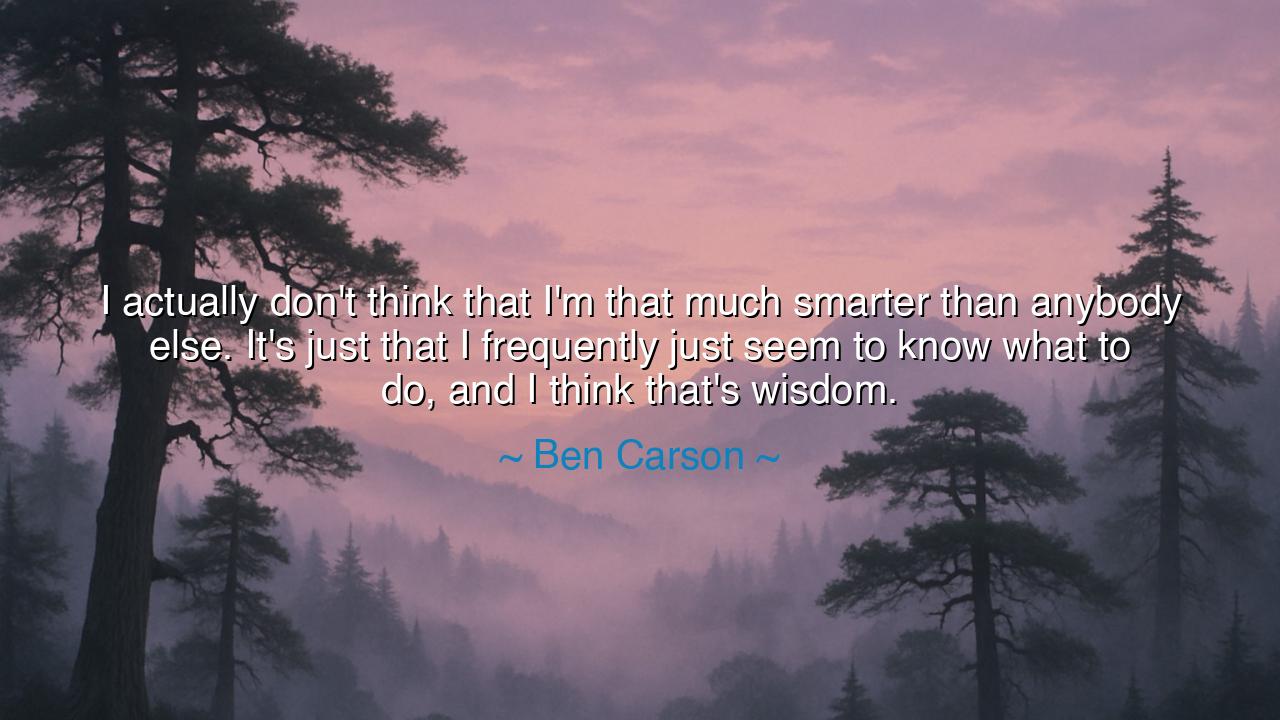
I actually don't think that I'm that much smarter than anybody
I actually don't think that I'm that much smarter than anybody else. It's just that I frequently just seem to know what to do, and I think that's wisdom.






Hearken, O children of discernment, to the words of Ben Carson, who speaks humbly of the nature of wisdom. He declares that he does not deem himself smarter than others, yet he often knows what to do, and in this discernment, he finds the essence of wisdom. Herein lies a teaching for the ages: true wisdom is not measured by intellect alone, nor by the loftiness of thought, but by the capacity to perceive the right course of action and to act decisively and rightly when the moment demands.
The origin of this reflection is rooted in Carson’s life as a pioneering neurosurgeon and thinker, whose hands and mind guided countless lives through the perilous unknown of the human body. In the operating theater, brilliance alone is insufficient; success demands the practical application of knowledge, the calm recognition of what must be done, and the courage to follow that insight. Here, wisdom manifests not as knowledge alone, but as timely, deliberate action, born of experience, reflection, and judgment.
The meaning of this aphorism is profound: to know the right action, and to act upon it with confidence, is to embody wisdom itself. Carson’s humility reminds us that wisdom is accessible to all, not a privilege of the exceptional, but a cultivation of observation, discernment, and readiness. One may possess no greater intellect than another, yet the capacity to navigate life’s challenges with insight and composure distinguishes the truly wise.
History provides vivid testimony to this truth. Consider Sophie Scholl, who, in the face of tyranny, discerned the right course of action—resistance to injustice—despite the risks to her life. Her knowledge and intellect were not exceptional, yet her wisdom shone through, guiding her decisions with clarity, moral courage, and unerring judgment. Her deeds illuminate Carson’s point: wisdom is knowing what to do when it matters most.
Moreover, this teaching extends to all mortal endeavors. Whether in healing, leadership, or daily life, the ability to recognize the proper path and act decisively is the hallmark of wisdom. It is cultivated through experience, reflection, and attentiveness to circumstance, not merely through learning or abstract thought. True discernment arises when the mind is attuned to reality, and the heart aligned with principle.
O generations yet unborn, carry this counsel within your hearts: strive not to surpass others in intellect alone, but cultivate the capacity to know what is right and to act with courage and clarity. In this lies the essence of wisdom, the quiet strength that guides action, shapes destiny, and leaves a legacy that transcends knowledge, circumstance, and the fleeting measure of intelligence.






NMNgoc Mai
This statement makes me reflect on humility and self-perception. Is Ben Carson suggesting that acknowledging limitations and relying on discernment is a form of wisdom itself? I also wonder whether confidence in decision-making is part of why some individuals are perceived as wise. Does experience amplify this ability, or can anyone cultivate it through mindfulness, observation, and learning from mistakes? It raises questions about the balance between knowledge, action, and insight in daily life.
TN9D Tuyet Nguyen
Reading this, I feel motivated to think about cultivating wisdom in daily life. It seems to suggest that consistent good judgment is more important than occasional brilliance. I also question the social perception of intelligence—are people often misled into equating quick thinking with wisdom? The quote encourages me to value discernment, patience, and reflection as key components of practical success, rather than relying solely on conventional measures of IQ or knowledge.
LDLe Dat
I’m intrigued by the implication that practical action is the essence of wisdom. Does this mean that intellectual knowledge without effective decision-making is incomplete? I also wonder whether this form of wisdom is more about intuition, pattern recognition, or disciplined reasoning. The quote encourages reflection on my own life—how often do I act wisely based on knowledge, and how often is instinct or timing more decisive than intellect alone?
LTLinh Tran
This quote sparks curiosity about how society measures success and intellect. If wisdom is more about knowing what to do than raw cognitive ability, how should we evaluate leaders, professionals, or mentors? I also question whether wisdom in one domain translates to others—can someone be ‘wise’ in medicine but not in finance or relationships? It makes me reflect on how diverse experiences and situational judgment shape perceptions of intelligence.
Q628. Tran Minh Quan 6A1
I feel a sense of humility in this statement. It challenges the common assumption that wisdom and intelligence are the same. I wonder if self-awareness plays a role here—does recognizing one’s own limitations enhance decision-making? It also prompts me to consider whether people who frequently make good choices are merely lucky, or if consistent patterns of judgment can be cultivated and taught, making wisdom a more accessible trait.